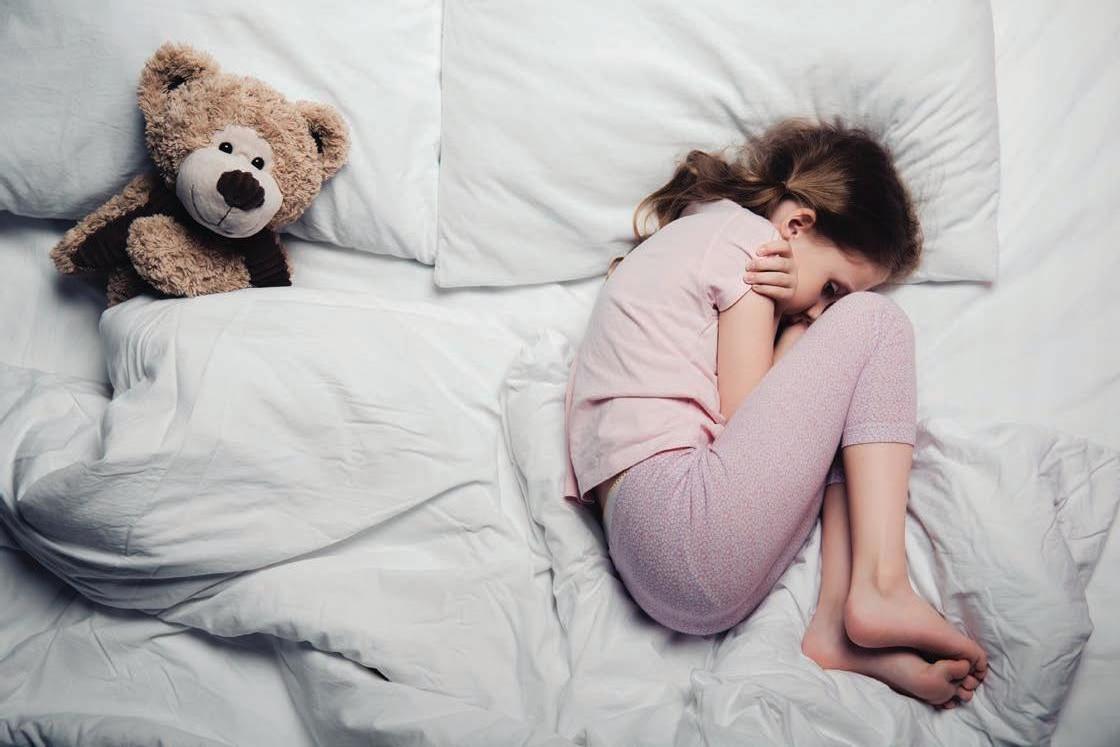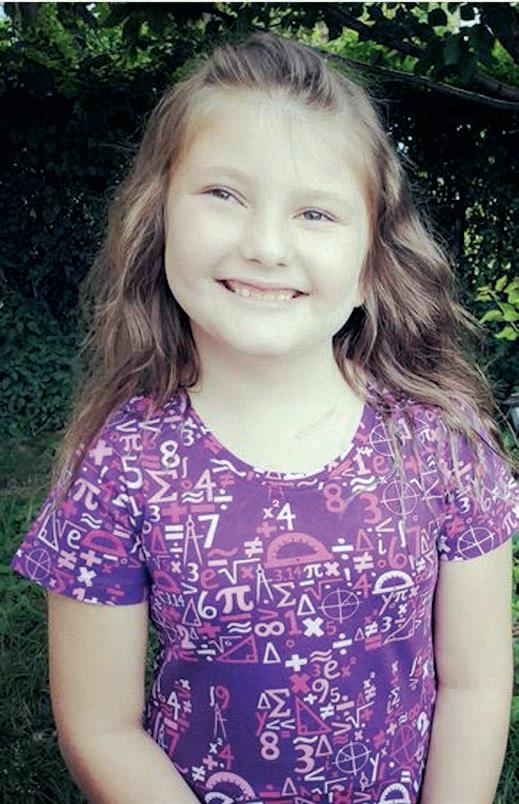
8 minute read
Child Anxiety: When to Worry
Child Anxiety:
This Is When You Should Start to Worry
It’s normal for kids to have bouts of fear—but when should you start to worry about your child’s anxiety?
BY STACEY FEINTUCH
Kids of all ages worry. Your baby cries when you leave the room. Your toddler may fear clowns. Separation anxiety may make your preschooler cry. Your elementary schooler may have a stomachache on the day of a spelling test. Middle schoolers may be nervous about making a presentation in front of their virtual or in-person class. Your high schooler may worry about getting a pimple.
Children have bouts of fears, worries, and anxiety at some point; these are totally normal feelings. “If you don’t have a range of emotions, that’s abnormal,” says Joel Friedman, Ph.D., clinical director at the Center for Family Guidance in Marlton, NJ. Normal childhood anxieties from new people, places, and experiences come and go throughout a child’s life. They need time to learn about, work with, and get comfortable with something new. “Kids are resilient,” says Sanam Hafeez, Psy.D., a New York City-based licensed clinical neuropsychologist, teaching faculty member at Columbia University’s Teachers College, and founder and clinical director of Comprehensive Consultation Psychological Services, P.C. “They’re able to shake off a lot of stuff.”
Some kids ask a lot of questions when they’re anxious. Others figure things out on their own, which can have negative consequences. “Children often ‘fill in the blanks’ with assumptions that can trigger anxious feelings,” says Connecticut-based psychotherapist Haley Neidich, LCSW.
SignS OF CHild ANxiEtY
It can be difficult for parents to admit when their child has a problem, Dr. Hafeez says. Usually, though, it will be so obvious
that you can’t ignore it. “You have to pay close attention to the signs and know when it’s time to get help,” she says. “Most of us are reluctant to admit that there is a problem. But on some level, we know.”
Here are some signs of when to worry about child anxiety: • tendency to worry about what can go wrong in any scenario • avoidance of specific activities, situations, or people • persistent stress despite an adult’s reassurance • trouble sleeping at night, insisting on sleeping with parents, or waking up with bad dreams • fears or worries that interfere with normal daily activities and are difficult to control • changes in appetite • phobias and fears that they’ll likely never encounter • headaches, fatigue, rashes, stomachaches, or other physical symptoms that are unrelated to other medical conditions • unrealistic worries (concerned about getting pregnant without having sex) • anxiety is out of proportion and they lack the insight to realize their worries are exaggerated (worry about SATs while only in grade school) • overly self-conscious (they won’t order in a restaurant for fear of humiliation) • anxiety is uncontrollable (crying at schooling because think their parent will die when they’re apart) • difficulty concentrating • significant change in anxiety in a short period of time • changes in relationships such as choosing not to be around people
WHen to WoRRy ABOut CHild ANxiEtY
Fears and worries are a natural reaction to new or stressful situations. “You should worry when the anxiety becomes persistent, constraining, and/or begins to impact or interfere with the child’s daily functioning. Facing anxiety or worry is normal and expected throughout childhood. It’s how the child copes when confronted with anxiety that makes the difference,” says Francyne Zeltser, Psy.D., a licensed psychologist and certified school psychologist in the New York metropolitan area. “If your child is having trouble coping and the anxiety or worries seem overbearing, it’s time to intervene and help.”
Speak directly to your child when you notice something isn’t typical for him, Dr. Friedman says. Younger children will be more vague, not provide as much insight, and won’t be able to pinpoint exactly how they’re feeling—hey may say they have a stomachache, for example. For older kids, choose a time of day to talk about their concerns or worries and why those are reasonable fears, then table the discussion for the day. “If they carry it with them all day long, it gets a life of its own,” Dr. Friedman says.
With kids home more due to the pandemic, they have less transitional time (they may not be on a school bus, for example) and structure that would typically distract them from their thoughts. “With their environment not changing, they may tend to focus more on what’s bothering them, and that makes it more intense,” he says. “They’re living too much in their head and not really living.”
HoW to HelP YOur CHild
try to figure out why your child is feeling anxious.
Consider what triggers the anxiety, how long your child is anxious, what helps reduce the anxiety, and what worsens it. “By better understanding why the anxiety occurs, you can help your child plan, so they feel prepared and confident to navigate the anxiety-producing situation,” Dr. Zeltser says.
don’t dismiss your child’s feelings.
You don’t want him to believe that something is wrong with him, so “it’s important to validate his feelings,” says Jessica Senick, MSW, LCSW, a psychotherapist who practices in Red Bank, NJ. Don’t take what’s happening personally: “It’s not necessarily indicative of something that you as a family have caused,” she says. If you pressure your child to feel a certain way, she may hide her real emotions, making it harder to see the seriousness of her anxiety. Ignoring an anxiety disorder puts him at increased risk of substance abuse, self-harm, and other negative coping strategies. “Helping your child heal from anxiety can help them learn to trust that their caregivers will be there for them when life gets bumpy in the future,” Neidich says.
consider Professional helP.
Get your child treatment from a mental health professional if what you’re doing isn’t working. “Childhood anxiety is common and treatable, especially when caught early on,” Dr. Zeltser says. Your child will be taught coping skills to help her manage the anxiety and reduce physical, emotional, and cognitive issues. She may be prescribed medication.
With proper treatment and support, most kids eventually outgrow childhood anxiety. “Remember, anxiety is rooted in a real or perceived fear of the unknown,” Dr. Zeltser says. “Providing your child with the tools they need to better circumnavigate their worries will accelerate their ability to overcome the anxiety.”
Stacey Feintuch is a freelance writer for print and online publications. She lives in Bergen County, NJ, and is mom to two boys.

Salvatore Indelicato
dMd, Pc
A long time resident of Staten Island, Dr. Salvatore Indelicato has been providing personal, gentle, quality orthodontic care to the Staten Island community for over 25 years. He received his dental degree, with highest honors, from the University of Florida and completed his orthodontic specialty training at the University of Medicine and Dentistry of New Jersey. Our state-of-the-art practice provides digital scanning and orthodontic treatments for children as well as adults. Recognized as a Diplomate of the American Board of Orthodontics, Dr. Indelicato is Board Certified and is a member of the American Association of Orthodontics. 444 huguenot Avenue Staten Island, nY 10312 718.967.5213 Instagram @bracesbydrsal
bracesbydrindelicato.com

Michael DeSimone
Ph.d, lcSW
Offering Telehealth therapy sessions via telephone or video during the pandemic. Treating a number of Acute Stress Disorders triggered by the ongoing threat of Covid 19. I continue to provide mental health services related to anxiety, depression, relationship difficulties, loss and grief for adults, adolescents and latency age children. Private and confidential.
175 burbank Ave (new dorp) 917.301.5962 michael.w.desimone@gmail.com
michaeldesimonetherapy.com
deRMATologY
Vanguard Dermatology
At Vanguard Dermatology your skin is our passion. It’s our privilege to provide expert and personalized skin care to you and your family. We offer medical, cosmetic and surgical services.
PedIATRIc denTISTRY
KIDS DeNtal
With over 25 years of specialty experience, Dr. Lazzara and her staff serve children of all ages and those with special needs. We offer general anesthesia and sedation in our office or at Staten Island University Hospital. We are board certified pediatric dentists.
1847 Richmond Avenue 2nd Floor Staten Island, nY 10314 212.398.1288
www.vanguarddermatology.com
4864 Arthur Kill Rd • 10309 718-356-kIdS (5437) Facebook @ kids dental of Staten Island Instagram @ kidsdentalofsi
www.sikidsdental.com

Congratulations... Caroline santloFer
Staten Island University Hospital’s Incredible Kids Awards Recipient
Congratulations to march’s Incredible Kid of the month, 9-year-old Caroline Santlofer! Caroline was nominated by her mom, who said: “I am nominating my daughter, Caroline, because every day I learn from her. She is intelligent, driven, curious, creative and funny. She does well in school and is well liked in her school community. She cares about all people and calls out injustice when she sees it. She cares about others’ feelings and feels deeply herself. She reminds me often to be a better person, and easily finds something good in anyone she meets. throughout the pandemic she has been patient and accepting of change, and has adapted to anything she has been asked to do. She makes me laugh and always brightens my day, and I believe that the world is a better place with her in it.”
noMinate an inCredible kid
Staten Island’s Incredible Kids Awards recognizes and honors outstanding children in the community. Nominees have helped others in need, donated time or effort to an important cause, boast impressive achievements at a young age, or simply stand out for their kindness and compassion.
The nominations for May’s Incredible Kids Awards are open May 1-15, 2021. To nominate a child, go to siparent.com/ incrediblekids and upload a photo, then explain in detail why he or she deserves to be selected as the Incredible Kid of the Month. Each selected honoree will be featured in an issue of staten island Parent and receive a $150 amazon gift card, courtesy of Staten Island University Hospital. Voting begins May 16.
Previous nominees may reenter for any upcoming month.
Featured PediatriC sPeCialist
Dr. Dolly Sharma, director of pediatric infectious diseases, is a board-certified specialist in the diagnosis and treatment of children’s diseases caused by bacteria, fungus, parasites, and other infectious agents. She has treated a wide variety of infections, including meningitis, Lyme disease, skin infections, diarrheal illnesses, complicated pneumonia, and bone and joint infections.
dr. dolly sharma, Md
Director of pediatric infectious diseases
718.226.5619










